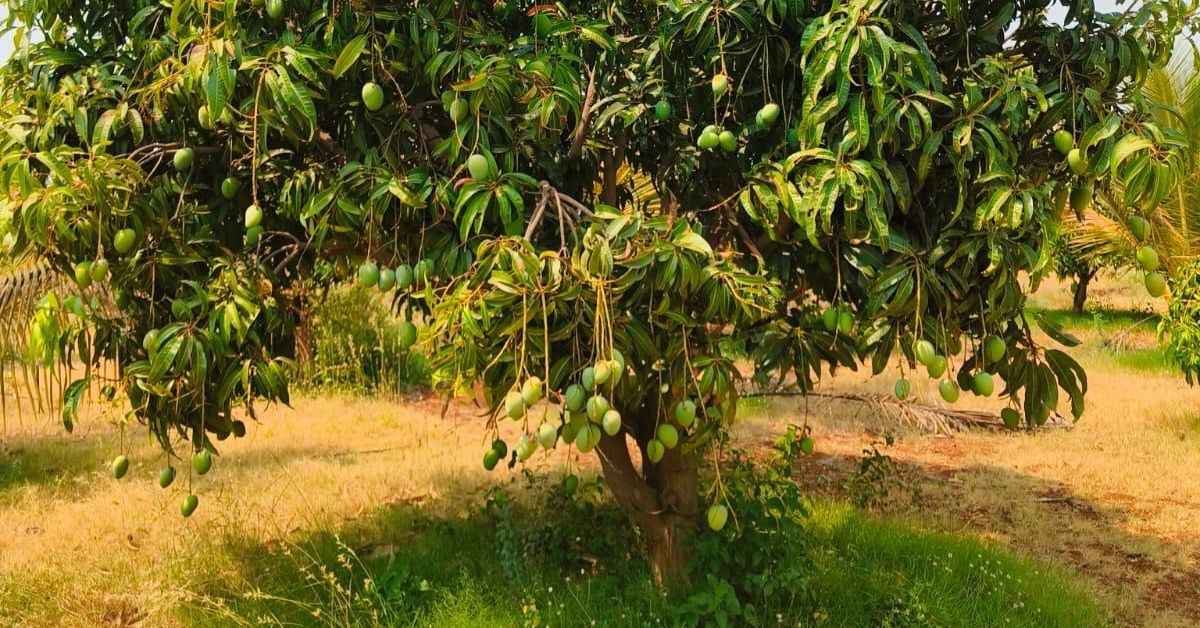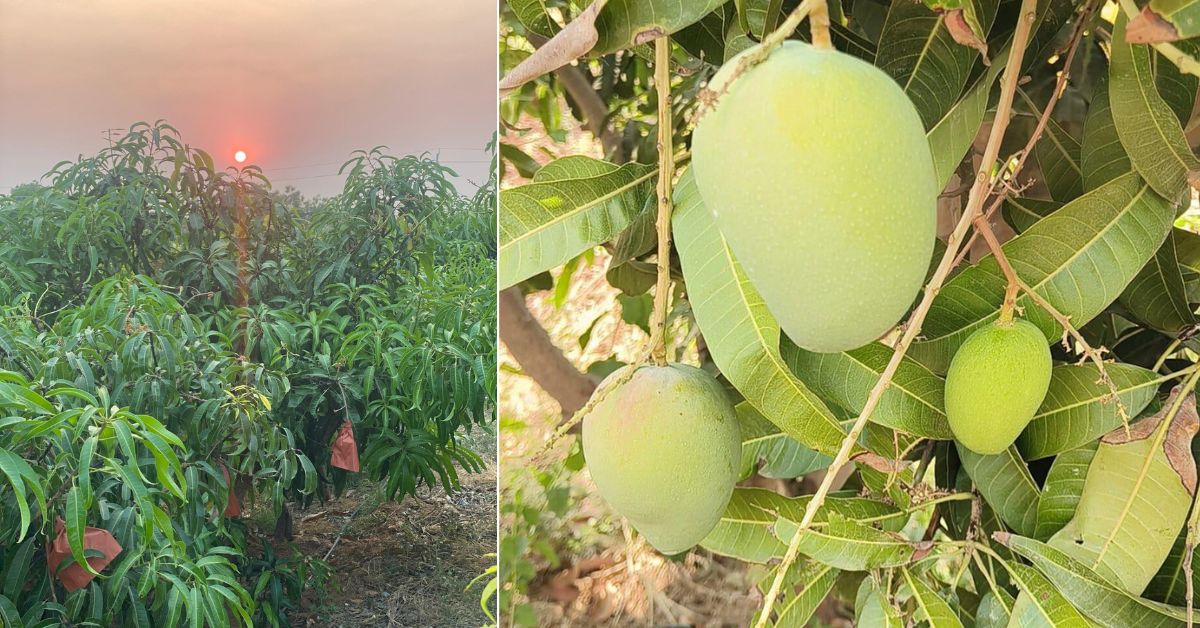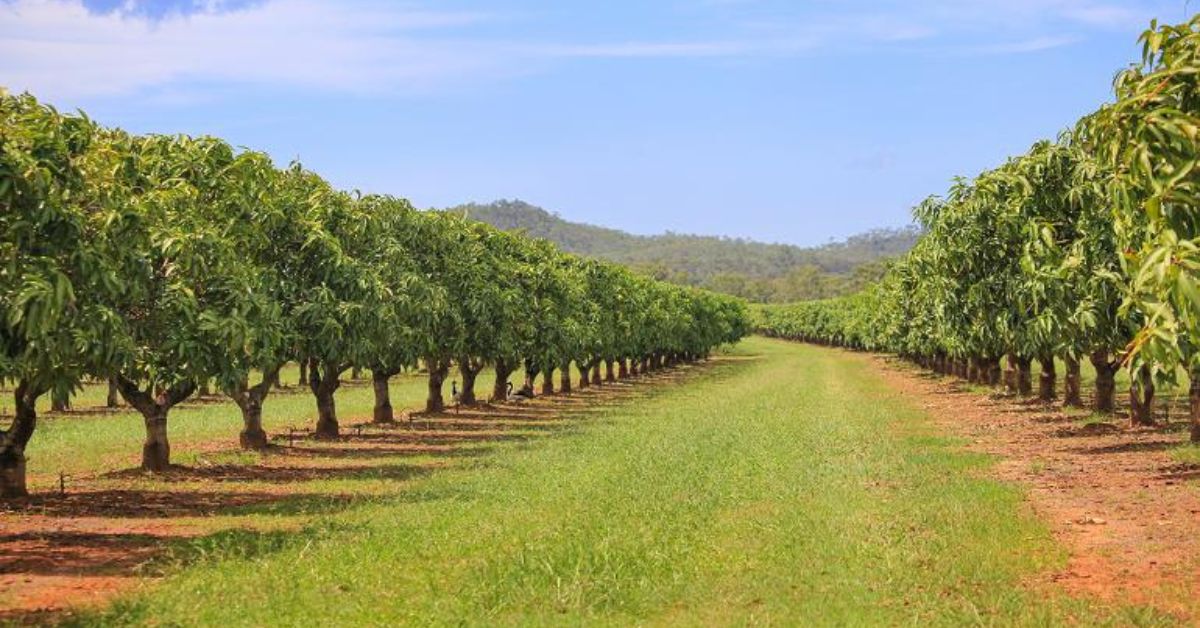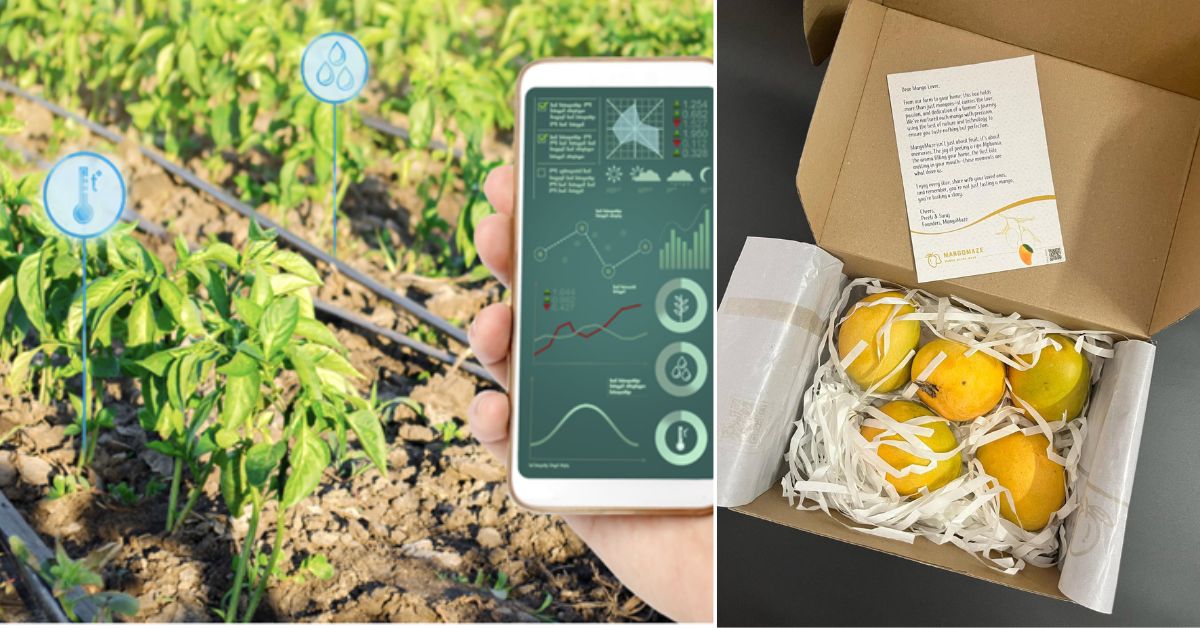How This Bengaluru Farm Grows 25000 Mango Trees with Drones & AI
At this farm in Bengaluru, a unique confluence of tradition and technology is reshaping the contours of mango cultivation. Here lies MangoMaze – a thriving orchard of 25,000 mango trees, where mangoes are being grown using drones, drip irrigation systems, and sensors to manage resources precisely.
The AI-driven drones quietly hum across the canopy, collecting vital data on tree health and pest presence. These flying marvels send real-time imagery and analytics back to the farm’s nerve centre, where adjustments in care can be curated with precision.
Drip irrigation systems reduce water use by a remarkable 70 percent by using technology to target specific needs rather than blanket irrigation, ensuring that every droplet counts in nurturing the luscious Ratnagiri Alphonso mangoes to perfection.
This minimises wastage and ensures that each tree receives the necessary nourishment. Interestingly, this method intensively plants 1,450 trees per acre — 15 times the traditional amount.
Behind this is the quantum density farming technique employed by Suraj Panigrahy. We sat down with him to learn how this technique can redefine the way mangoes are grown in India.
 Suraj estimates a production of about 40 tonnes of mangoes this season.
Suraj estimates a production of about 40 tonnes of mangoes this season.
Why Europe has all the fun
A BITS Pilani alumnus, Suraj worked for about two decades in the corporate sector at companies like Wipro, Nokia, and Make My Trip, before embarking on this unique journey that takes him back to his roots.
With his father serving in the Indian Navy, Suraj’s formative years were spent across various parts of India, unknowingly sowing the seeds of a global perspective. His professional stints took him across continents, from the US to Europe, where he absorbed diverse agricultural practices, notably grapevine farming in Europe.
During his time working with an agritech startup focused on the vineyards and wine industry, Suraj was exposed to a fusion of advanced analytics and farming methods across various European countries, including Austria, Italy, Germany, and France. This exposure introduced him to the high efficiency and market sophistication of the European grape cultivation methods.
“Those grapevines flourished in tight proximity, each precisely nurtured with an exact mix of nutrients and care. I was impressed by how these practices elevated the humble grape into a celebrated commodity within the glorified wine industry,” he shares.
“What if Indian mangoes could be cultivated with the same precision?” he pondered.
Recognising the scalable model and potential for replication, Suraj began to envision similar possibilities for Indian crops, particularly the globally recognised Alphonso mango.
Thus, the concept of MangoMaze took root.
 Suraj grows mangoes using the quantum density farming technique that maximises the yield.
Suraj grows mangoes using the quantum density farming technique that maximises the yield.
The science behind the sweetness
Suraj began transforming his vision into reality by acquiring a 15-acre plot of barren land in Bengaluru. In 2018, he began setting up the infrastructure and planting the saplings, and formally launched MangoMaze in 2021.
Through his efforts, Suraj has adopted advanced technologies such as drones and IoT-driven drip irrigation systems to optimise resource efficiency.
In stark contrast to conventional methods, where 50 to 80 mango trees spread languidly across an acre, Suraj’s farm boasts a bustling orchard with 25,000 trees on 15 acres.
The strategy hinges on precision: trees are planted just three feet apart, with seven feet between rows.
“The strategic planting involves positioning trees three feet apart with a seven-foot gap between rows. This allows us to maximise yield by planting 1,450 trees per acre, at least 15 times denser than traditional farming. This significantly boosts the yield up to seven times. We estimate a production of about 40 tonnes of mangoes this season. So far in 2025 alone, we have sold over 50,000 boxes of Alphonso mangoes,” he explains.
Behind maintaining such density without overcrowding lies the real magic in the farm’s orchestration of advanced technology — a symphonic harmony of artificial intelligence, drones, and sensors.
 Suraj has planted trees maintaining a distance of three feet between trees and seven feet between rows.
Suraj has planted trees maintaining a distance of three feet between trees and seven feet between rows.
Prashant Patalay, who leads the innovative tech vision behind MangoMaze’s AI-powered platform for farm digitisation, shares, “By utilising IoT sensors, satellite imagery, and AI dashboards, we diligently monitor soil health, irrigation, and pest activity. Our cutting-edge tools include precision irrigation systems, microclimate sensors, solar weather stations, and AI yield prediction models.”
The use of AI-driven drones and advanced soil and plant health monitoring systems ensures no need is overlooked. Drones elegantly glide over the orchard, analysing crop health and guiding interventions. Drip irrigation systems precisely regulate water use, whereas sensors monitor soil nutrients, ensuring each tree receives tailored nutrition.
The traditional method relies heavily on natural rainfall or flood irrigation, which can lead to inefficient water usage. Pest control often involves the use of chemical pesticides that can affect the soil health and plant quality over time.
This intelligent use of data to inform planting, fertigation, and harvesting schedules leads to enhanced productivity and quality. Prashant, the chief technology officer, reiterates, “The benefits of this setup include higher crop yields, reduced water usage, improved disease control, and consistent fruit quality. The data-driven approach optimises yield density per acre while minimising inputs. Crucially, it empowers farmers with data-driven decision-making, export readiness, and enhanced market access through our digital ecosystem.”
By integrating these learned practices, MangoMaze redefined traditional Indian mango farming methods, channeling the same strategic vision he saw in Europe into the development of India’s first Quantum Density Mango Farm. Suraj, who is currently based out of Barcelona, manages the farm with the help of local labourers and farmers, who have been engaged through their smart farm management systems software.
Suraj openly acknowledges, “I had no prior experience in farming.” Yet, it’s precisely this unfamiliarity that adds a unique twist to his journey. “When you come from a technical background, you don’t carry the baggage of ‘this is how it’s always been done.’ You ask: Why not better?” adds Suraj. This perspective allowed him to view farming not as a limitation, but as an intricate problem ready to be addressed.
This helped him transform MangoMaze into a thriving model of tech-powered, high-density mango farming.
 Suraj established a thriving orchard of 25,000 mango trees, where mangoes are being grown using drones, drip irrigation systems, and sensors.
Suraj established a thriving orchard of 25,000 mango trees, where mangoes are being grown using drones, drip irrigation systems, and sensors.
‘Why shouldn’t Alphonso stand in equal to Europe’s finest wines?’
Suraj’s ambition stretches beyond cultivation; he aims to reposition Indian mangoes in the global market. “Why shouldn’t the Alphonso stand on equal footing with Europe’s finest wines?” he questions.
Indeed, despite being the largest mango producer, India exports only a fraction of its fruits.
Due to less intensive agronomic practices, Suraj says, the yield in traditional farms is relatively lower. “The quality and consistency of mangoes might vary, affecting the marketability on a global scale. Only about 10-12 percent of Indian mangoes are exported due to these quality constraints.
A significant barrier has been inconsistent quality; MangoMaze seeks to change that narrative through standardisation. “The quantum density method gives consistent, high-quality mangoes that meet export standards. This includes proactive pest management using natural means like neem oil and bee pollination practices to boost productivity by 25-30 percent,” he shares.
At MangoMaze, tradition is not left behind but elevated through technology. “We wish to showcase what’s possible when traditional agricultural practices meet the new-age technological prowess,” he adds.
As Suraj nurtures his orchard, he sends a message rippling through India’s agricultural landscape: “The future of farming lies not just in what we grow, but how we grow it,” he says.
Edited by Vidya Gowri; All images courtesy Suraj Panigraphy
News